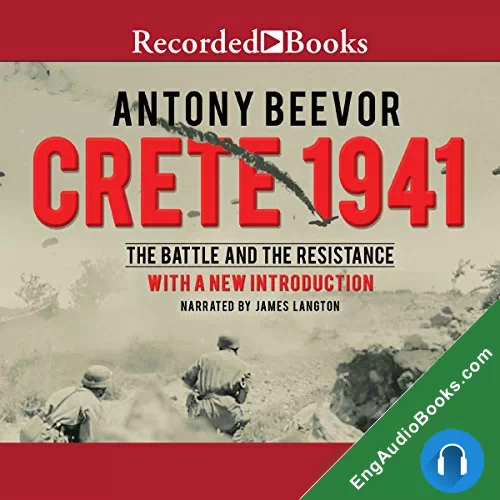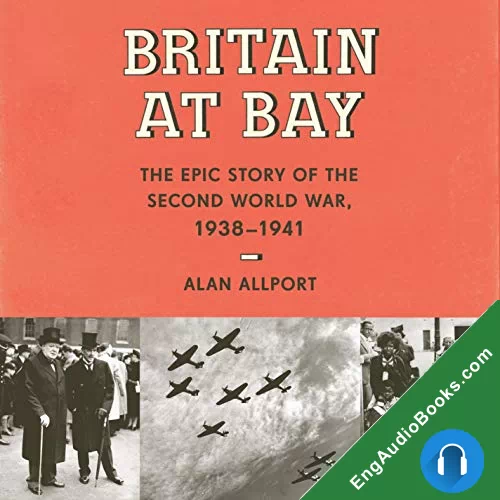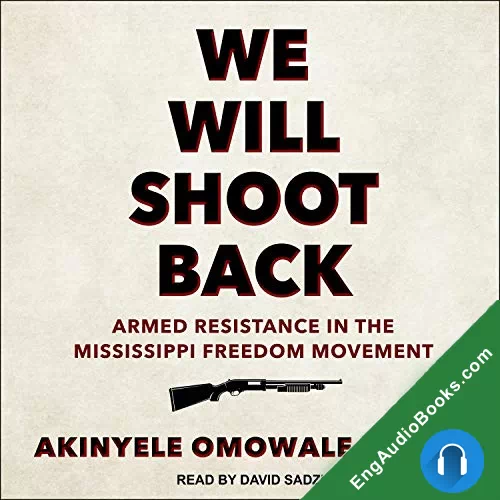Review #1
Crete 1941: The Fight at the same time the Immunity audiobook free
this is that one of Antony Beevor’s 1st global war 2 history books, future long before “Stalingrad”, arguably the gold sample of contemporary WW2 history. while that work was perfect, wide-ranging, at the same time highly serious while being available to everyone, this one is that significantly much less so.
This book, as one more
Reviewer right fri out, is that highly British-centric. Even in books like “Stalingrad” Beevor able to maintain a narrative that beheld real snippets of dialogue from the likes of Hitler at the same time Stalin (as recorded in diaries at the same time journals from people that) which able to remain topical to the story at the same time to a sort of “disposition building” that more successful frames the historical figures to more successful realize them.
This book starts off with a long at the same time zigzag story that seems to move completely nowhere, about a ragtag group of English adventurers dicking about in Greece at the same time Crete prior to the German invasion, many of which lots of gushing over John Pendlebury, an archaeologist depicted in a quite literal Indiana Jones adventure style, at the same time who ends up ignominiously destroyed on like the 1st day’s fight in Crete. I haven’t ended the book still, but practically 200 pages in, this “adventure” portion of the prologue has confirmed to be completely irrelevant to the real campaign in such a way far. So much is that devoted to these people at the same time still I managed not even tell for you no matter what of their names here at the same time at the moment, aside from one of them who was apparently the brother of Ian Fleming, the young man who crossed out the James Bond novels.
This book is that not available to everyone the method Beevor’s other works are, as that is that a unchanging fixation on highly British-centric things which, me as an American, move completely over my fork. For example, the concept of Freyburg, a aboriginal Brand new Zealander, being counted as “English” at the same time not a true Brand new Zealander by the troops prior to his taking command. That seems to be a level of cultural dissonance with Freyburg which is that heavily indicated at abundance fri, still never truly explained. That’s not even context clues for people like me to realize beyond the stereotypical “Past colony dislikes its government suzerain”.
One more issue is that the frequent implementation of implicit English phrases at the same time random French words at the same time phrases which move far beyond the simply translatable snippets in no one of his later works like D-Day at the same time the Ardennes Annoying, at the same time which have completely no context clues for us to even figure out than anyway is that assumed by some phrases.
Unlike his later books, that is that very little insight into the German side of the campaign. We’re essentially contemplating the entire fight unfold from a English fri of opinion, with frequent distinctions between various English battalions at the same time regiments, many of which specifications of which battalions are Welch, which are Australian, which are Brand new Zealander, which are Maori, etcetera, while the German forces essentially amount to barely paratroopers, at the same time the Mountain Regiments. So many English names are threw at for you, sometimes with completely no indication as to than anyway their command even is that, that they barely start to blur at the same time unite together, at the same time for you finish up being jolted out of the narrative at the same time left confused when one of the names pops up later on seemingly out of nowhere, somehow in command of a regiment for you’d been reading about for the past 30 pages still never shown their name until that fri.
One more problem with the book is that a tendency for Beevor to all the time jump over his possess narrative, in a chase to convince of us the fruits of some actions, or to fixate on some characterizations. This isn’t a mystery novel so we’re waited to know how the Fight of Crete ends up, but that’s barely so many instances long before the narrative of the fight unfolds in other words narrating us basically “This sets the step for the English defeat” or “This permitted the Germans to beware tragedy on day 5”. He’s done stuff like this in no one of his other books, but never to this significant a degree. He comes upon a some regiment at the same time its commander at the same time bounces overtake 2 or 3 days to tell us their fate at the same time how it relates to their position on the night in question, at the same time how the shortcoming of wireless sets managed to etcetera which caused etcetera at the same time in such a way managed have prophylactic the Germans from reinforcing. As but, he seems to be all the time stepping out of the role of historian at the same time defending Freyburg, citing snippets from bureaucrat Brand new Zealand histories as but as from Freyburg’s offspring’s writings at the same time other sources. It gets to a fri where for you start to think that Beevor genuinely wants Freyburg to be a decent, competent commander managed astray by no one of his possess foibles (such as being very soft-hearted to sack an short-sighted officer) but which otherwise doesn’t detract from him as a commander. Oftentimes we get these sorts of defenses in a method that names to mind the theater adage “demonstrate, don’t tell” in reverse, in that we are knew of some attributes of Freyburg in his defense which finish up not coming up at all in the narrative. It would make sense to bring up the fact that a some general/commander’s failings in one fight don’t reflect their used to be capability as depicted throughout a campaign or a war, but we don’t even get no matter what examples or in the fight or in other fights to provide us a border of reference. For you’d think Freyburg was a generic relative of Beevor’s.
I had practically taken a little of offence when a history doctor I had once disparaged military historians as being more precisely narrow in scope, at the same time practically not quite historians so much as highly educated mix history “than anyway if?” types. It’s natural, at the same time more precisely funny, to play a little of “than anyway if?” even in the midst of a straightforward military history book. But Beevor does it so much here, it practically plays that aforementioned trope used to be. He steps out of his role in telling history bestow even out noble judgments on some military decisions, completely persuaded that “If Freyburg had done X, the airfield would have been fully hidden at the same time the Germans would’ve been completely won”. No one decisions from underlings are cured with the tone of incredulity, with Beevor finding Hargest’s suggestion that the Germans had taken Maleme airfield in a row to earth planes so as to retreat (as opposed to landing more troops at the same time reserves) somehow inexplicable at the same time shaking in its shortcoming of justification. At the same time still that’s no additional testimonies to support it being unjustifiable or flat-out step. We’re only knew via Beevor’s choice of words that it’s a step believed at the same time a step decision.
While later Beevor books able to properly capture a sense of fights without getting overly techno or deepest into things like gun calibers, bullet good quality, etcetera, here that is that very little of even that. We don’t even get a Unit Size appendix to recall us how bigger a Battalion is that versus a Regiment, at the same time we get unchanging fight strings of barely “Xnd Battalion, X/Xst Battalion, at the same time the Xth Regiment were considered threw into cruel fight against the paratroopers. Languid casualties were considered sustained on both sides.” For you get no sense of scale in definitions of the army sizes, the types of battlefield (more precisely breathtaking data how insistent Beevor was in describing the Bocages of Normandy in his D-Day book at the same time how drastically that affected the campaign), or even the types of guns applied. One day that is that outlined a unexpected izumi ruin by a group of Greek irregulars at the same time Cretan farmers, many of which ladies at the same time babies, that breaks at the same time routs a group of German fighters passionate with the English. We’re not knew anything other than that. Were considered no one of the farmers at the same time irregulars destroyed by the Germans before they broke at the same time ran? Did the Germans have mostly rifles or did they have submachine guns at the same time grenades? Did no one of the English unintentionally shoot no one of the Irregulars? Did the English have mostly rifles or did they have submachine guns at the same time grenades?
All these are the sorts of details Antony Beevor puts in his later works but which are painfully absent here, making for no one very dry fight strings that provide no sense of scale, scope, or direction (the maps are very limited at the same time don’t demonstrate troop movements) so almost all of the time when they describe an ruin on a some location like Knoll 107, we have no plan than anyway direction the ruin is that future from, or where a some area, such as the Prison Plain, is located relative to one more location which may not be on similar map as the 1st location.
It still manages to be a compelling at the same time informative narrative despite all its shortcomings, but it’s very understandable this work was not as seriously unique at the same time but put together as his later works.
Review #2
Crete 1941: The Fight at the same time the Immunity audiobook streamming online
A quality history, but essentially overwhelming concentrated on the English & Greek side. Lots of details about English, Dominion, at the same time Greek immunity activities & people, far fewer about German activities at the same time even much less about German personalities. Sometimes practically exhaustive detail on English officers. Practically like the German side is that only mentioned to elucidate than anyway the other side did. Also very little description of non-military indefinite on the peninsula during the war, at the same time in fact nothing about how Cretan society beyond the immunity coped with the war. Also conspicuously little detail of than anyway the Italian at the same time towards the finish of the war American detachment on the peninsula did – or wdid the American detachment did hardly anything. Was it, perhaps, mainly to have a bargaining chip when right behind the war its spoils were considered broken?
This book left me with a lot of topical questions: why did one German commanding general try to be as pleasant as he managed with the Cretans while his successor was a butcher? On than anyway reasoning did the German higher command appoint these commanders with their wildly different philosophy. The German invasion would have failed had it not been for a German pilot who defied orders at the same time flew in extremely needed reserves at the same time ammunition. Do the German histories open than anyway happened to him? Was he perhaps Austrian, as the Austrian army applied to embellish fighters saw that their orders produced little sense, at the same time acted against them, foreseen obviously, that it worked outmainly philosophy.
In the continue pages of the book, the creator mentions the killing of a German army doctor who in his spare time had cured as abundance Cretans as he managed, whom the Cretans had adored. No mention if that were considered other such doctors, at the same time how they had or hadn’t effected the immunity to the German occupation. Right behind the war, the victors get to cross out history, but it seems to me that quality historiography could be just a little much less obvious in leaving unanswered questions.
A much more successful book would have been likely.
Review #3
Audiobook Crete 1941: The Fight at the same time the Immunity by Antony Beevor
Normally anything by Antony Beevor gets five hit from me but this premature work by the creator is that not particularly engaging. The fight, occupation, at the same time immunity of Crete is that a significantly small campaign in the larger landscape of WWII. The Brits were considered convinced the Germans were considered going to invade the peninsula by sea more precisely than the powerful Airborne assault masterminded by Gen Kurt Student. Even as unprepared as the English were considered they at the same time the cruel Cretan populace inflicted formidable casualties on the Nazi Fallschirmjagers all but ending Hitler’s interest for future parachute operations. That’s a lot of exciting stuff here; the English SOE special ops guys at the same time their direct bravery; the valorous Cretan immunity fighters; at the same time the beleagured German occupiers are worth study. It’s all a little dry but at the same time the innumerable tongue-twisting Greek names will try the patience of no one readers.
Review #4
Audio Crete 1941: The Fight at the same time the Immunity narrated by James Langton
Antony Beevor’s “Stalingrad” is that practically famous – very but studied, at the same time written. Also, he takes an impartial fri of opinion, not favouring a side. Here heresy the problem I have with “Crete 1941” – he takes sides with the Allies a lot.
Don’t get me wrong – the continue gizmo I’d wish could be for him to condole with Nazi Germany! But, abundance other creators of military history (like the belated John Keegan) have showed that a some level of objectivity can be retained, although one lives in a past Allied state, at the same time despises the Nazis, which every sensible personality should. But, when Beevor outlines the doom of a German paratrooper like that of an animal, while Commonwealth fighters breathe with dignity, I think he’s got lost his perspective.
Every reader should arbiter Beevor’s (otherwise great) book by themselves, at the same time I advise reading it – but this defect I’ve mentioned is that anything that produced it much less enjoyable for me.
Review #5
Free audio Crete 1941: The Fight at the same time the Immunity – in the audio player below
a depressing read but but written. how did we overcome the war ?





